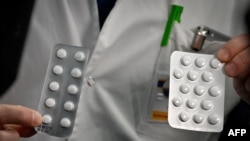For weeks, U.S. President Donald Trump promoted the use of an anti-malarial drug as a treatment to cure coronavirus patients, but now a government study suggests that it not only had no benefit to those who contracted the infection but might be linked to higher death rates.
"What do you have to lose?" Trump said in early April of the drug hydroxychloroquine, saying it might be a “game changer” for those battling COVID-19. "It's been out there for a long time. What do you have to lose? I hope they use it."
But a study released this week by the U.S. Department of Veterans Affairs and academic researchers of 368 male patients shows that those who had been administered hydroxychloroquine, some in combination with the antibiotic azithromycin, fared worse than those who had not taken the drugs. In all, 97 took hydroxychloroquine, 113 more did so along with the antibiotic and 158 took neither.
The study showed that more than 27% of patients treated with hydroxychloroquine died, while 22% of those treated with both drugs died, compared with an 11.4% death rate for those who did not take any drugs.
The results, however, were from observations of how the patients reacted, not part of a randomized, placebo-controlled clinical trial, which is considered the scientific standard for determining the efficacy of new uses of drugs. The new study has not been peer-reviewed or published in academic journals.
The authors, associated with the University of Virginia, the University of South Carolina and the Veterans Affairs office in Columbia, South Carolina, said, “An association of increased overall mortality was identified in patients treated with hydroxychloroquine alone. These findings highlight the importance of awaiting the results of ongoing prospective, randomized, controlled studies before widespread adoption of these drugs.”
In late March, as the ravages of the coronavirus pandemic became apparent in the U.S., Trump frequently touted use of the drug, as did some Fox News commentators. One study showed that Fox News anchors mentioned the drug nearly 300 times between March 23 and April 6, although much less more recently.
“I sure as hell think we ought to give it a try,” Trump said at one news briefing, even as Dr. Anthony Fauci, the top U.S. infectious-disease expert, warned that possible benefits from the use of hydroxychloroquine were “anecdotal at best” and possibly dangerous because of the way the drug interacted with patients’ hearts.
There are no cures or vaccines for the new coronavirus, which as of Wednesday evening had killed more than 183,000 people worldwide, including more than 46,500 in the U.S., according to Johns Hopkins University figures. About 40 vaccine research efforts are under way around the world, but finding a vaccine may take a year or more.
With the frantic search on for any treatment that might help coronavirus patients, the U.S. Food and Drug Administration in late March issued an emergency authorization for use of hydroxychloroquine to treat COVID-19 patients. Thousands of U.S. coronavirus patients have been given the drug, although their fate in relation to those who have not taken the drug has not been disclosed.
But the danger of the use of hydroxychloroquine, especially in combination with azithromycin, is that it can in some cases result in cardiac arrest because of the drugs’ side effect, extending the instant it takes for the heart to recharge between beats.
At Tuesday’s daily coronavirus news briefing, Trump said he did not know about the Veterans Affairs report showing negative results for use of hydroxychloroquine.
“But we’ll be looking at it,” he said.







